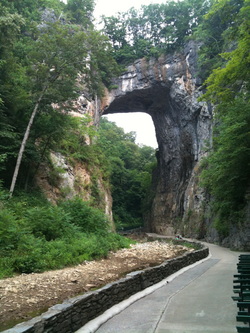 This last week I drove from my old home in Massachusetts to my new home in Florida. I didn't have time for much sightseeing along the way, but I could not resist the chance to visit Natural Bridge in Virginia again. I had not been there since a trip with my grandparents back in 1976—thirty-five years ago, to the month. On one level, the bridge is just a big rock that happens to have a hole eroded through it by the persistance of a small creek trickling under it for hundreds of millions of years. It is the result of a quirky accident of circumstances, you might say, and no more. However, that does not begin to explain the emotional impact that this 215-foot-high arch has on the human imagination. The sight of thousands of tons of rock suspended in the air is dizzying. Contemplating the forces that shaped it over eons is humbling and awe-inspiring. Even more, the hugeness of the bridge makes me think about all of the other wonders of creation—large and small—that go unnoticed in our everyday world. The bridge is like a postcard from God that says, "Just in case you weren't noticing, I thought I'd give you humans a miracle that is too big even for you to ignore. Enjoy." Natural Bridge is a reminder of God's presence in the world—a presence that announces itself in the wonders of a universe that is too big, too complex, too subtle and too overwhelming for us to completely understand. For me, God is revealed in nature. Certainly, there is much in Jewish tradition and practice that encourages us to seek God's presence in nature. We follow the natural cycles of the seasons and the moon, and we make blessings to appreciate natural phenomena like thunder, mountains and earthquakes. There also is much in Judaism that asks us to respect the natural world. We are commanded not to waste the earth’s resources and to treat animals with compassion and respect. Yet, Jewish tradition also holds that God cannot be equated with nature. God is often depicted in Jewish tradition as transforming and transcending the natural world. The God who can part the waters of the Red Sea or cause the sun to stand still is a God who stands apart from and above the natural order. God is depicted in Jewish tradition, literally, as supernatural, above nature. In Jewish law, many things that are "natural" to do, are forbidden. Eating various types of foods, working on Shabbat, even the restrictions on sexual behavior, can be seen as curbing our natural instincts and desires. On the other hand, many of Judaism’s positive commandments tell us to do things that have no basis in nature. Fasting on Yom Kippur, praying daily, and—perhaps most “unnatural” of all—the ritual of circumcision, are all acts that declare that we human beings, too, need to go beyond that which is natural and reach for something higher than physical and material reality. Jewish tradition is clear that when we are in our natural state, we are not yet at our ideal state. In that sense, too, Virginia's Natural Bridge speaks to me as an object lesson about what truly is natural and supernatural. It declares that, despite conventional perceptions, stone can hover in the air. Trickles of water can carve monuments grander than anything made by human hands. Wonders and miracles are hidden in every grain of sand. When I wrap my mind around these ideas, I realize that the things I am tempted to call "supernatural," really are natural after all. That which usually seems "natural" is actually beyond my understanding. |
|
7/11/2011 03:02:21 am
I think I remember you teaching a lesson about these ideas of God as "natural" or "supernatural" a few years ago at Shavuot... Comments are closed.
|
WelcomeThis blog is about living a joyful Jewish life and bringing joy to synagogues and the Jewish community. Join the conversation by commenting on posts and sharing your experiences. For more on the topic, read the First Post.
Recent PostsPurim & COVID-19
The Honor of Heaven Chasing Our Own Tails Drilling Under Your Seat Change the World Self-Righteousness Where We Came From What We Must Believe Is Passover 7 or 8 Days?Origin Story Va'eira: Leadership Jeff's Favorites• First Post
• Searching for How the Bible Defines Marriage • The Difference between God and Religion • In the Beginning of What? • Rape, Abortion and Judaism • Ten Thoughts about Being a Rabbi • Temple Dues and Don'ts • A Pesach Lesson from Yoga • The Purpose of the Torah Torah PortionsGenesis
Bereshit Noach Lech Lecha Vayera Chayei Sarah Toledot Vayetze Vayishlach Vayeshev Miketz Vayigash Vayechi Exodus Shemot Va'eira Bo Beshalach Yitro Mishpatim Terumah Tetzaveh Ki Tisa Vayakhel Pekudei Leviticus Vayikra Tzav Shemini Tazria Metzora Acharei Mot Kedoshim Emor Behar Bechukotai Numbers Bamidbar Naso Beha'alotecha Shelach Korach Chukat Balak Pinchas Matot Masei Deuteronomy Devarim Va'etchanan Ekev Re'eh Shoftim Ki Tetze Ki Tavo Nitzavim Vayelech Ha'azinu Vezot Haberachah Holidays Shabbat Rosh Chodesh Pesach/Passover Omer Period Yom HaShoah Yom HaZikaron Yom Ha'atzma'ut Pesach Sheini Lag B'Omer Yom Yerushalayim Shavuot Fast of Tammuz Tisha B'Av Tu B'Av Rosh Hashanah Days of Awe Yom Kippur Sukkot Hoshanah Rabbah Shmini Atzeret/ Simchat Torah Chanukah Tu BiShvat Adar (Joy Increases!) Purim Archives
October 2023
Loading
|

 RSS Feed
RSS Feed
